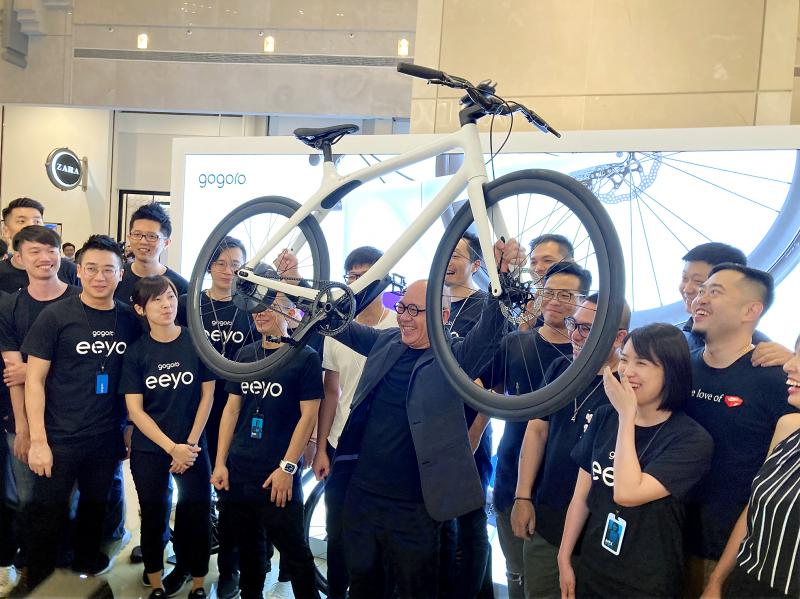Gogoro Inc (睿能創意) yesterday launched its first electric bicycle, the Gogoro Eeyo 1, in Taiwan, after unveiling the bike in New York in late May and in France on Tuesday.
The company said it would also introduce the series in other European countries such as Germany and the Netherlands.
The “Eeyo project” is the fourth of Gogoro’s eight projects that concentrate on smart transportation, which includes Gogoro’s electric scooter, battery swap system and electric scooter sharing service, company founder and chief executive officer Horace Luke (陸學森) told a media briefing in Taipei.

Photo: Lisa Wang, Taipei Times
“There are various types of city commuters. We will not focus on only one type of commuter. We want to expand our reach to overseas markets by offering different technologies and products,” Luke said.
“The electric bike market is much larger than that of electric scooters,” Luke said.
In Germany, 1.8 million electric scooters were sold last year, but sales of electric bikes were two to three times that number, he said.
With a carbon fiber frame, Gogoro Eeyo 1 weighs only 11.8kg — almost half the weight of electric bikes on the market — and carries a minimum price tag of NT$119,980, the company said.
Gogoro has packed all of the bike’s electric components — including a motor, battery and sensors — inside its rear hub.
The company has set up its first flagship store for the Eeyo series at Taipei 101. The bikes will also be available at select stores operated by Gogoro and eight stores of its distributor Pentagon Co (聚昕), it said.
Overseas, the Eeyo series would only be available in virtual stores in the initial stage, Gogoro said.
The company said it is in talks with several bike vendors over potential electric bike production, duplicating the business model it has for electric scooters.
Gogoro produces electric scooters for Yamaha Motor Taiwan Co (台灣山葉), Aeon Motor Co (宏佳騰), Motive Power Industry Co (摩特動力) and Suzuki Motor Corp in Taiwan.
“There are a lot of small-scale bike makers that do not have the capability to develop their own electric models. They can opt for Gogoro to help, if they want to tap into this market,” Gogoro marketing chief Peng Ming-i (彭明義) told reporters.
With Gogoro’s rear hub, those conventional bicycles can be transformed into electric bikes, Peng said.
“We are in talks with some partners,” he said.
Gogoro said it does not plan to launch sharing services for its electric bikes in the short term.

Application-specific integrated circuit designer Faraday Technology Corp (智原) yesterday said that although revenue this quarter would decline 30 percent from last quarter, it retained its full-year forecast of revenue growth of 100 percent. The company attributed the quarterly drop to a slowdown in customers’ production of chips using Faraday’s advanced packaging technology. The company is still confident about its revenue growth this year, given its strong “design-win” — or the projects it won to help customers design their chips, Faraday president Steve Wang (王國雍) told an online earnings conference. “The design-win this year is better than we expected. We believe we will win

Intel Corp chief executive officer Lip-Bu Tan (陳立武) is expected to meet with Taiwanese suppliers next month in conjunction with the opening of the Computex Taipei trade show, supply chain sources said on Monday. The visit, the first for Tan to Taiwan since assuming his new post last month, would be aimed at enhancing Intel’s ties with suppliers in Taiwan as he attempts to help turn around the struggling US chipmaker, the sources said. Tan is to hold a banquet to celebrate Intel’s 40-year presence in Taiwan before Computex opens on May 20 and invite dozens of Taiwanese suppliers to exchange views

Chizuko Kimura has become the first female sushi chef in the world to win a Michelin star, fulfilling a promise she made to her dying husband to continue his legacy. The 54-year-old Japanese chef regained the Michelin star her late husband, Shunei Kimura, won three years ago for their Sushi Shunei restaurant in Paris. For Shunei Kimura, the star was a dream come true. However, the joy was short-lived. He died from cancer just three months later in June 2022. He was 65. The following year, the restaurant in the heart of Montmartre lost its star rating. Chizuko Kimura insisted that the new star is still down

While China’s leaders use their economic and political might to fight US President Donald Trump’s trade war “to the end,” its army of social media soldiers are embarking on a more humorous campaign online. Trump’s tariff blitz has seen Washington and Beijing impose eye-watering duties on imports from the other, fanning a standoff between the economic superpowers that has sparked global recession fears and sent markets into a tailspin. Trump says his policy is a response to years of being “ripped off” by other countries and aims to bring manufacturing to the US, forcing companies to employ US workers. However, China’s online warriors